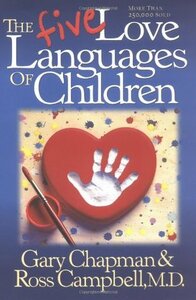You need to sign in or sign up before continuing.
Take a photo of a barcode or cover
challenging
informative
inspiring
reflective
fast-paced
informative
reflective
medium-paced
I'd love to give the first half of this book a 4 or 5 and the second half a 1 or 2. The description and examples of the 5 love languages was very helpful and I could relate to our family. However, the suggestions, especially during a panedmic, fell flat for me.
First, the book at minimum needs an update. A reference to his severely retarded child caught me off guard. The comment that "some" children who grow up with a single parent do well in life was judgmental. And the multiple references to "needing a father and a mother" did not take account same sex parents (that was never addressed). Also the comment that people are generally less happy after a divorce makes it clear that this is a christian parenting book, not just a parenting book.
Maybe it wasn't a good idea to read during a pandemic. His comments against electronics fell flat for me given the circumstances. And lots of the suggestions just aren't a possibility right now. But I'm not sure that's a fair criticism given the very special circumstances we are living, just that it made me feel worse at times and I had to remind myself to not let the momma guilt kick in.
That said, it does help figure out how our kids (and spouses) show and receive love and how they can feel unloved even though we think we show them plenty of love. Physical touch, acts of service, gifts, words of affirmation and quality time: We all need all of them but we might appreciate some more than others. Explains why I feel less or more happy at times, and I can see in my son why he feels more or less happy at times too. I suggest you read up on the love languages but it's ok to skip the second half. It's what I plan to do with the "Five love languages" book.
First, the book at minimum needs an update. A reference to his severely retarded child caught me off guard. The comment that "some" children who grow up with a single parent do well in life was judgmental. And the multiple references to "needing a father and a mother" did not take account same sex parents (that was never addressed). Also the comment that people are generally less happy after a divorce makes it clear that this is a christian parenting book, not just a parenting book.
Maybe it wasn't a good idea to read during a pandemic. His comments against electronics fell flat for me given the circumstances. And lots of the suggestions just aren't a possibility right now. But I'm not sure that's a fair criticism given the very special circumstances we are living, just that it made me feel worse at times and I had to remind myself to not let the momma guilt kick in.
That said, it does help figure out how our kids (and spouses) show and receive love and how they can feel unloved even though we think we show them plenty of love. Physical touch, acts of service, gifts, words of affirmation and quality time: We all need all of them but we might appreciate some more than others. Explains why I feel less or more happy at times, and I can see in my son why he feels more or less happy at times too. I suggest you read up on the love languages but it's ok to skip the second half. It's what I plan to do with the "Five love languages" book.
Pretty good but very similar to the other 5 Love Languages books I've read. I didn't gain a ton of new information but this book did have great reminders and a bunch of good points! Lots to highlight to refer back to later.
This book has opened my eyes to a new aspect of parenting--understanding the essential desires of your child's heart. Some of the suggestions were a little too over-the-top for me, but I really liked the core premise of the book. I want my children's love tanks to always be filled and this book gave me a new way to look at what my children REALLY need from me. I suggest this book for any parent.
slow-paced
informative
inspiring
reflective
fast-paced
I wanted to be able to rate this higher. It was helpful but only if you sifted past all the heavy biases
Disclaimer. I stopped reading this book before finishing the first chapter (touch). I couldn’t bring myself to continue. This book is incredibly gendered. Without citing any research, the author makes broad sweeping claims about how “girls feel the need to be valued as teens and so seek physical affection” while “boys withdraw from physical touch”. While there may be some accuracy here, there is no acknowledgement of outliers, nor is there explanation that society, bias, and acculturation play an enormous role in interpretation and expression of behaviors. And again, no research cited. Couldn’t finish, would not recommend.


